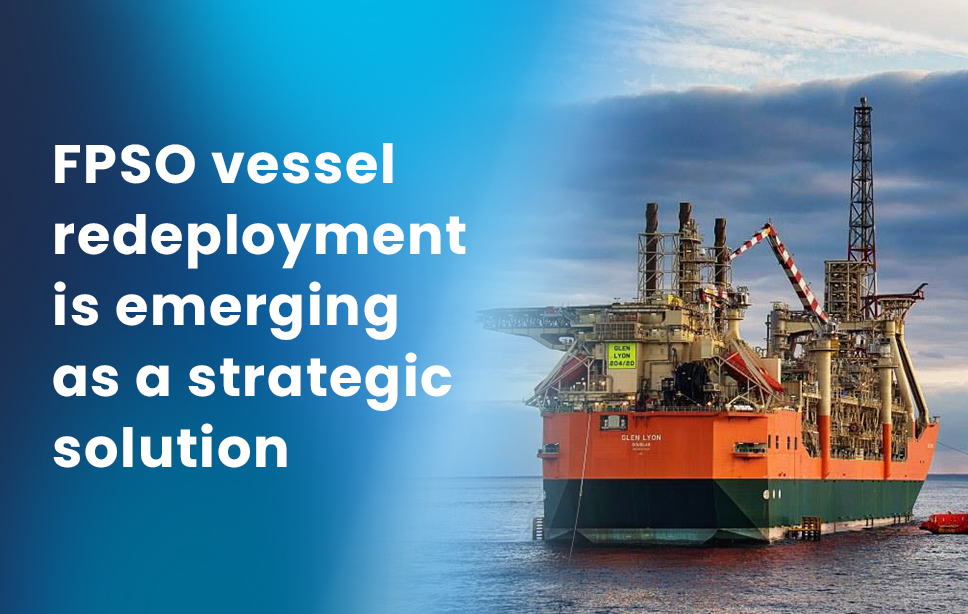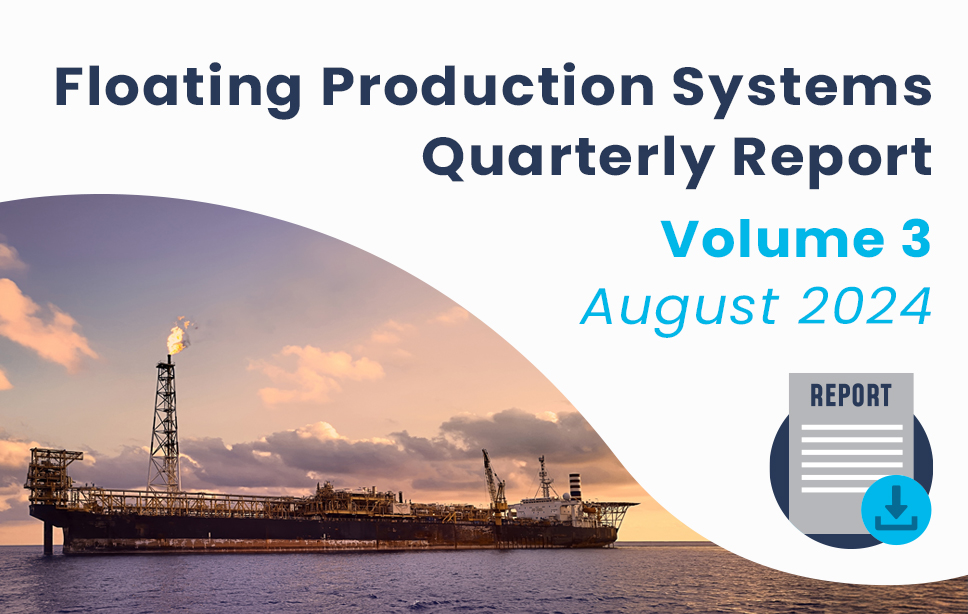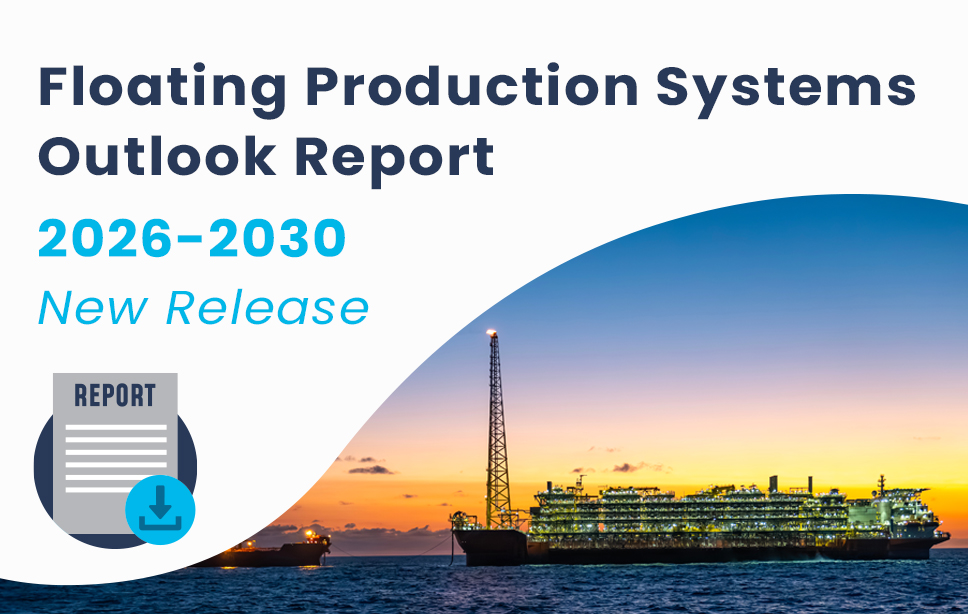Demand for Floating Production Systems Forecasted
As the global oil and gas industry pivots towards floating production systems, Energy Maritime Associates (EMA) has released a pivotal report today...

When evaluating development options for a floating production system, operators must weigh several paths—newbuild, vessel conversion, and redeployment of an existing unit. Each option involves a unique set of technical and commercial considerations.
While newbuilds and conversions dominate market share, redeployment offers a compelling alternative, particularly in scenarios where speed, cost efficiency, and asset availability are critical. Redeployment of existing floating production units is a strategic option across various offshore development types—including marginal fields, phased developments, fast-track projects, and frontier or emerging regions.
Regardless of the context, selecting the right unit for redeployment is critical to ensuring project success, balancing technical compatibility, commercial viability, and operational readiness.
The makeup of currently available units is 27, and that includes 19 FPSOs, 3 Semi-subs, 2 FSOs, 1 Barge, 1 MOPU, and 1 Spar.
![Graphic for blog - Available FPS-2[38]](https://blog.energymaritimeassociates.com/hs-fs/hubfs/EMA%20New%20Graphics/Graphic%20for%20blog%20-%20Available%20FPS-2%5B38%5D.png?width=910&height=720&name=Graphic%20for%20blog%20-%20Available%20FPS-2%5B38%5D.png)
Figure 1. Available FPS Units by Years Available, Capacity & Storage
Evaluating FPSO redeployment opportunities requires a careful balance of technical, regulatory, and commercial considerations. Vessel suitability hinges on factors such as design life, environmental conditions, processing capabilities, and reservoir-specific needs like water or gas injection.
Regulatory requirements—including local content, age limits, and hull compliance—vary by region and must be addressed early. Commercially, deal structure can be influenced by the FPSO owner’s role and the unit’s book value, impacting pricing and contract terms.
LLOG Salamanca – After ceasing production in 2015, the Independence Hub semi-submersible platform was successfully redeployed by LLOG in 2022 to develop the Leon and Castille fields in the U.S. Gulf of Mexico.
First oil was achieved in September 2025, marking a milestone as the first refurbished production unit in the Gulf of America to return to service. The project’s construction and outfitting were completed entirely in Texas and Louisiana, showcasing a domestically executed redevelopment that avoided overseas fabrication and accelerated delivery.
BW Adolo – Following its early release by Murphy in 2013 due to low production volumes, the Azurite FPSO was redeployed from Congo to Gabon. In 2018, it began producing from the Dussafu field for BW Energy.
This redeployment stands out as a success story, with the operator strategically designing the development around the FPSO’s existing capabilities—maximizing efficiency and minimizing lead time.
Petrojarl I – FPSO Petrojarl I was the industry’s first purpose-built harsh environment FPSO, achieving first oil in 1986. Originally operated by Altera Infrastructure (formerly Teekay Offshore), it has been deployed across 11 offshore fields over nearly four decades, showcasing exceptional flexibility and resilience.
Most recently, Petrojarl I was used on the Atlanta field in Brazil’s Santos Basin, operated by Brava Energia (formerly 3R Petroleum), before being replaced by the FPSO Atlanta in 2024. In 2025, the vessel was acquired by Amplus Energy, marking a new chapter focused on redeployment opportunities in regions such as Vietnam, Suriname, Brazil, and West Africa.
These redeployments were successful because each project strategically aligned the vessel’s capabilities with field requirements, minimized refurbishment costs through well-preserved assets, and leveraged flexible designs and domestic execution to accelerate timelines and reduce risk. Operators also planned developments around the redeployed units, ensuring technical compatibility and commercial viability from the outset.
At Energy Maritime Associates (EMA), our screening studies for redeployment guide operators through these complexities, helping identify viable units aligned with project goals.
Specialized floating production redeployment studies empower operators—from global majors to agile independents—with actionable intelligence to support front-end loading (FEL) teams.
By identifying available or soon-to-be-available units, evaluating technical compatibility, and aligning with field-specific requirements, EMA streamlines vessel selection and project planning through redeployment studies. Our reports also include cost and schedule assessments, along with tailored contracting and procurement strategies—enabling faster execution, reduced CAPEX, and optimized asset utilization in today’s dynamic offshore market.
EMA supports successful FPSO redeployment by equipping operators with actionable intelligence and strategic guidance throughout the planning and execution process. From identifying suitable vessels and assessing technical compatibility to benchmarking costs and outlining tailored contracting strategies, we help front-end loading (FEL) teams navigate complexity, reduce risk, and align redeployment opportunities with project goals.
For broader offshore insight, EMA’s Market Intelligence links redeployment opportunities to the wider floating production landscape—delivering the data and analysis operators need to stay one step ahead. To make confident offshore decisions, explore our Market Intelligence solutions, including the Flowline® platform and Floating Production Report Series, trusted by more than 200 companies worldwide.
Please contact us to schedule a meeting to discuss how we can answer your questions about the floating production sector.
Eric Sherman at eric.sherman@energymaritimeassociates.com

As the global oil and gas industry pivots towards floating production systems, Energy Maritime Associates (EMA) has released a pivotal report today...

Get all the latest details in the Q3 August issue of the Floating Production Systems Quarterly Report by Energy Maritime Associates (EMA)

Energy Maritime Associates (EMA) has released its latest Floating Production Outlook Report (2026–2030), providing a detailed assessment of market...